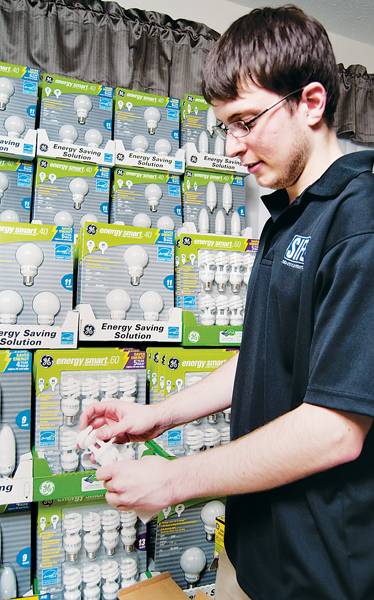ISU group promotes efficiency

Jeff Dotzler, junior in marketing, inspects one of over 1,000 energy-efficient light bulbs that are currently stored in his apartment. They will be installed at several local businesses this week. Photo: Logan Gaedke/Iowa State Daily
December 6, 2009
Jeff Dotzler, junior in marketing, has over 1,000 light bulbs in his 400-square-foot apartment.
“I kind of shoved them underneath the bed, and I shoved them up in closets. I have them sitting beside my sink,” Dotzler said. “It’s a mess. I’m going to be honest with you.”
Dotzler is a member of Students in Free Enterprise, an ISU organization hoping to promote sustainability in business. By Friday, all of the energy-efficient compact fluorescent light bulbs will be installed at Jeff’s Pizza Shop, 2402 Lincoln Way, and Haverkamp Properties, 4720 Mortensen Road — the first step in making the two businesses more environmentally friendly.
“We’re going to transform their business to make them become more environmentally sustainable,” Dotzler said.
For Haverkamp, the group is replacing 16 light bulbs in 60 units.
“I love to be energy-efficient, so I jumped at the opportunity to team up with them,” said Dave Hyman, property manager with Haverkamp.
Dotzler estimated that over the five-year lifespan of the new bulbs, the switch would save the company approximately $50,000 and would amount to a reduction of 663,120 pounds of carbon dioxide emissions.
“Even though in the long-run it is already much more cost effective, I still hope that the cost of compact fluorescents will come down a little bit,” Dotzler said, “so businesses don’t have to be in the situation where, ‘well, do I spend 50 cents per bulb, or do I spend $3 per bulb?’”
But bulbs are just the beginning.
The Students in Free Enterprise team will install motion-sensor paper towel dispensers and motion-sensor lights in some of the businesses’ public restrooms, as well as a device to reduce the amount of water used per-flush by toilets. The group will implement a recycling program for the Haverkamp office.
“We’re also going to swap out some harmful toxic chemicals for some new eco-friendly cleaning supplies,” Dotzler said.
There’s an educational component to the project as well. The club is going to distribute materials on going green personally.
“It’s very simple stuff that we’re going to put into a pamphlet and put on the tables at Jeff’s Pizza in addition to the media and the sustainability symposium coming up at Iowa State,” Dotzler said.
The entire project will be wrapped up by Feb. 1. The organization will then turn in project materials and compete with other chapters for the chance to move on to regional and national competition, along with the opportunity to present their project to executives at Sam’s Club, one of the national sponsors of Students in Free Enterprise.
“When you go to regionals, you get to meet with the CEO of Sam’s Club,” Dotzler said. For Dotzler, who works at Sam’s Club, it’s like “the Superbowl.”
The local ISU chapter also received a $1,000 grant from Sam’s Club to execute its project.
“To me, it’s a great way to make it real,” said Amy Jo Watzek, assistant manager of Sam’s Club, 305 Airport Road. “We’re not just saying ‘we’re going to go green.’” Dotzler estimated the entire project would cost about $3,000.
“In large part the project will be covered by the $1,000 grant from Sam’s Club and the lighting rebates from the City Of Ames,” Dotzler said. “However, if we find some ideas that cost a little more, our organization is going to kick in.”
Know your bulbs:
Incandescent light bulbs
An incandescent bulb produces light by running electricity through a small filament, heating it until it begins to glow. Because light is generated through heat, incandescent bulbs are inefficient compared to compact fluorescents.
Lifetime – 1,000 hours
Approximate cost per unit – 50 cents
Compact fluorescent light bulbs
Fluorescent lights produce light by driving an electric current through a tube containing argon and mercury. This generates UV light, which reacts with a fluorescent coating on the tube, causing it to emit visible light. Fluorescent bulbs use about 75 percent less electricity than incandescents and must be recycled because of their mercury content.
Lifetime – 10,000 hours
Approximate cost per unit – $2






